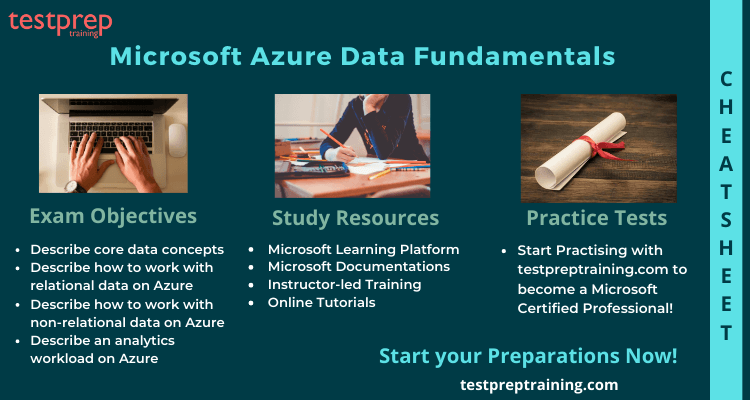If you’re looking to pursue a career in data analytics or simply want to improve your skills in Microsoft Azure, DP-900 certification is the right place to start. This certification validates your knowledge of fundamental data concepts and Azure services and helps you gain a solid understanding of the basics of cloud data services.
To help you prepare for the DP-900 exam, we’ve created this cheat sheet that covers all the essential topics you need to know to pass the certification with flying colors. From understanding the basics of Azure data services to exploring key data concepts such as data ingestion, storage, processing, and security, this cheat sheet provides you with a comprehensive overview of all the topics you need to know for the exam. So, whether you’re new to Azure data services or looking to brush up on your skills, this cheat sheet is the perfect resource to help you prepare for the DP-900 exam and take your data skills to the next level. Let’s dive in!
Glossary of Microsoft Azure Data Fundamentals Terminology
Here is a glossary of commonly used terminology related to Microsoft Azure Data Fundamentals:
- Azure: Microsoft’s cloud computing platform and services that offer solutions for building, deploying, and managing applications and services.
- Azure SQL Database: A fully managed relational database service that runs on Azure.
- Azure SQL Data Warehouse: A cloud-based enterprise data warehousing service designed to handle large amounts of data.
- Blob Storage: A scalable object storage service for unstructured data in Azure.
- Cosmos DB: A globally distributed, multi-model database service designed for high availability, consistency, and low latency.
- Data Lake: A scalable and secure data repository for big data analytics workloads.
- Data Lake Analytics: A cloud-based analytics service that allows you to analyze data stored in Azure Data Lake Store.
- Data Warehouse: A centralized repository that allows organizations to store, manage, and analyze large amounts of data.
- HDInsight: A fully managed cloud-based service for running Hadoop, Spark, and other big data frameworks.
- SQL Server: A relational database management system (RDBMS) developed by Microsoft.
Exam preparation resources for Microsoft Azure Data Fundamentals: DP-900 Exam
Here is a list of official exam preparation resources for the Microsoft Azure Data Fundamentals (DP-900) exam:
- Microsoft Learning Paths: Microsoft provides free online learning paths to prepare for the DP-900 certification exam. The learning path includes modules, hands-on labs, and assessments. You can access the learning path here: https://docs.microsoft.com/en-us/learn/certifications/exams/dp-900
- Official Microsoft DP-900 Certification Exam page: The official Microsoft DP-900 Certification Exam page provides an overview of the exam, skills measured, and registration details. You can access the page here: https://docs.microsoft.com/en-us/learn/certifications/exams/dp-900
- Microsoft DP-900 Exam Study Guide: The Microsoft DP-900 Exam Study Guide provides an overview of the exam structure, skills measured, and preparation tips. You can access the guide here: https://query.prod.cms.rt.microsoft.com/cms/api/am/binary/RE4thcj
- Microsoft DP-900 Certification Exam Practice Test: Microsoft offers a practice test for DP-900 Certification Exam. The practice test contains 40 questions to help you prepare for the exam. You can access the practice test here: https://www.microsoft.com/en-us/learning/certification-exams/dp-900
- Microsoft DP-900 Certification Exam Training Course: Microsoft offers instructor-led training courses for DP-900 Certification Exam. The course covers the exam objectives and provides hands-on labs. You can access the training course here: https://www.microsoft.com/en-us/training/course.aspx?cid=DP-900T00
Please note that these resources are subject to change. Checking for the latest updates and resources on the official Microsoft Learning website is always a good idea.
Microsoft DP-900: Exam Overview
Microsoft Azure Data Fundamentals DP-900 exam is designed for candidates having good foundational knowledge of core data concepts. The Azure Data Fundamentals exam can be used for preparing for other Azure role-based certifications that includes Azure Database Administrator Associate or Azure Data Engineer Associate.
Knowledge required for the exam
- Firstly, Candidates applying for the Microsoft Azure Fundamentals DP-900 exam must know how to implement core data concepts using Microsoft Azure data services.
- Secondly, They must have familiarity with the concepts of relational and non-relational data as well as different types of data workloads such as transactional or analytical.
- Thirdly, Candidates for this exam should begin to work with data in the cloud.
Cheat Sheet for Microsoft Exam DP-900
The Microsoft DP-900 Exam Cheat Sheet is designed to help you get ready for the exams. It will walk you through all the learning resources. Moreover, the resources covered in this Cheat Sheet will help you refresh your skills and concepts related to the exam while providing you with all the important insights.

Have Detailed Knowledge of the DP-900 Exam Objectives
Firstly, you must have clarity about the exam details and policies. It is very important to have such information handy before beginning your revision journey. Moreover, familiarising yourself with the exam course is yet again very essential to grasp the exam concepts. Given the wide syllabus this exam covers, it is suggested that you refer to the Official DP-900 Exam Guide and learn more about the exam course. This exam covers 4 domains which are further subdivided into various topics. Each topic is essential for you to ace the exam.
1. Describe core data concepts (25—30%)
Describe ways to represent data
- Describe features of structured data (Microsoft Documentation: Understand data store models)
- Describe features of semi-structured (Microsoft Documentation: Query semi-structured data in SQL)
- Describe features of unstructured data (Microsoft Documentation: Understand data store models)
Identify options for data storage
- Describe common formats for data files (Microsoft Documentation: Data formats supported by Azure Data Explorer for ingestion)
- Describe types of databases (Microsoft Documentation: System Databases)
Describe common data workloads
- Describe features of transactional workloads (Microsoft Documentation: Online transaction processing (OLTP))
- Describe features of analytical workloads (Microsoft Documentation: Azure Cosmos DB analytical store)
Identify roles and responsibilities for data workloads
- Describe responsibilities for database administrators
- Describe responsibilities for data engineers (Microsoft Documentation: Data engineer)
- Describe responsibilities for data analysts
2. Identify considerations for relational data on Azure (20—25%)
Describe relational concepts
- Identify features of relational data (Microsoft Documentation: Describe concepts of relational data)
- Describe normalization and why it is used (Microsoft Documentation: Description of the database normalization basics)
- Identify common structured query language (SQL) statements (Microsoft Documentation: Structured Query Language (SQL))
- Identify common database objects (Microsoft Documentation: Database Identifiers)
Describe relational Azure data services
- Describe the Azure SQL family of products including Azure SQL Database, Azure SQL Managed Instance, and SQL Server on Azure Virtual Machines (Microsoft Documentation: Azure SQL, Azure SQL Database, SQL Server on Windows Azure Virtual Machines)
- Identify Azure database services for open-source database systems (Microsoft Documentation: Azure SQL Database)
3. Describe considerations for working with non-relational data on Azure (15—20%)
Describing capabilities of Azure storage
- Describe Azure Blob storage (Microsoft Documentation: Azure Blob storage)
- Describe Azure File storage (Microsoft Documentation: Azure Files)
- Describe Azure Table storage (Microsoft Documentation: Azure Table storage)
Describe capabilities and features of Azure Cosmos DB
- Identify use cases for Azure Cosmos DB (Microsoft Documentation: Common Azure Cosmos DB use cases)
- Describe Azure Cosmos DB APIs (Microsoft Documentation: Azure Cosmos DB: REST API Reference)
4. Describe an analytics workload on Azure (25—30%)
Describing common elements of large-scale analytics
- Describe considerations for data ingestion and processing (Microsoft Documentation: Azure Data Explorer data ingestion overview)
- Describe options for analytical data stores (Microsoft Documentation: Choose an analytical data store in Azure)
- Describe Azure services for data warehousing, including Azure Synapse Analytics, Azure Databricks, Azure HDInsight, and Azure Data Factory (Microsoft Documentation: Data warehousing in Microsoft Azure, Azure Synapse Analytics)
Describe consideration for real-time data analytics
- Describe the difference between batch and streaming data (Microsoft Documentation: Explore fundamentals of real-time analytics)
- Identify Microsoft cloud services for real-time analytics
Describe data visualization in Microsoft Power BI
- Identify capabilities of Power BI (Microsoft Documentation: Power BI)
- Describe features of data models in Power BI (Microsoft Documentation: Model data in Power BI)
- Identify appropriate visualizations for data (Microsoft Documentation: Visualization types in Power BI)
Quick Links to your Study Resources
To ace the exam, you need to choose the best set of resources suited to your type and your level of understanding. There are numerous resources that can be used to have a good DP-900 study guide. As you have probably been preparing for the exam and are on the revision journey, we provide you a list of some highly suggested resources to amplify your preparations:
Microsoft Learning Platform
The learning resource that will be beneficial during the exam preparation is the Microsoft learning platform. It helps you to deeply understand the exam concepts. These are available on the Microsoft Learning Platform as follows:
- Firstly, Azure Data Fundamentals: Explore modern data warehouse analytics in Azure
- Secondly, Azure Data Fundamentals: Explore non-relational data in Azure
- Thirdly, Azure Data Fundamentals: Explore relational data in Azure
- Also, Azure Data Fundamentals: Explore core data concepts
Microsoft Documentations
After that, you can move on to Microsoft documentation where you can easily understand about the Microsoft Azure Data Fundamentals exam concepts using the learning concepts that cover various modules. These Microsoft Docs modules will help you gain a lot of knowledge about Azure data concepts and the different services in the same. The learning concepts include:
- To begin with, Exploring core data concepts
- Then, Studying about relational data in Azure
- Also, Studying about non-relational data in Azure
- Moreover, Exploring modern data warehouse analytics in Azure
Instructor-led Training
Microsoft provides Instructor-led Training courses for candidates to learn the fundamentals of database concepts in a cloud environment. Moreover, to get basic skills in cloud data services, and build their foundational knowledge of cloud data services within Microsoft Azure. Candidates in the Microsoft Azure Data Fundamentals Course will identify and explain core data concepts such as relational, non-relational, big data, and analytics. Further, they will explore the roles, tasks, and responsibilities in the world of data. In this DP-900 exam training, they will understand the relational and non-relational data offerings, provisioning, and deploying databases. And, they will explore Azure Synapse Analytics, Azure Databricks, and Azure HDInsight including Power BI.
Online Tutorials
Online Tutorials enhance your knowledge and provide a depth understanding of the exam concepts. Additionally, using the DP-900 tutorial, they will also covers exam details and policies. Therefore learning with Online Tutorials will result in strengthening your preparation.
Practice Tests
This can be a very essential part that can help you to prepare better for the exam. That is to say, Microsoft DP-900 exam practice tests are important as by assessing yourself with these tests you will know about your weak and strong areas. However, by practicing you will be able to improve your answering skills that will result in saving a lot of time. Moreover, the best way to start doing practice tests is after completing one full topic as this will work as a revision part for you. So, make sure to find the best practice questions. Therefore, Start Practising Now!



